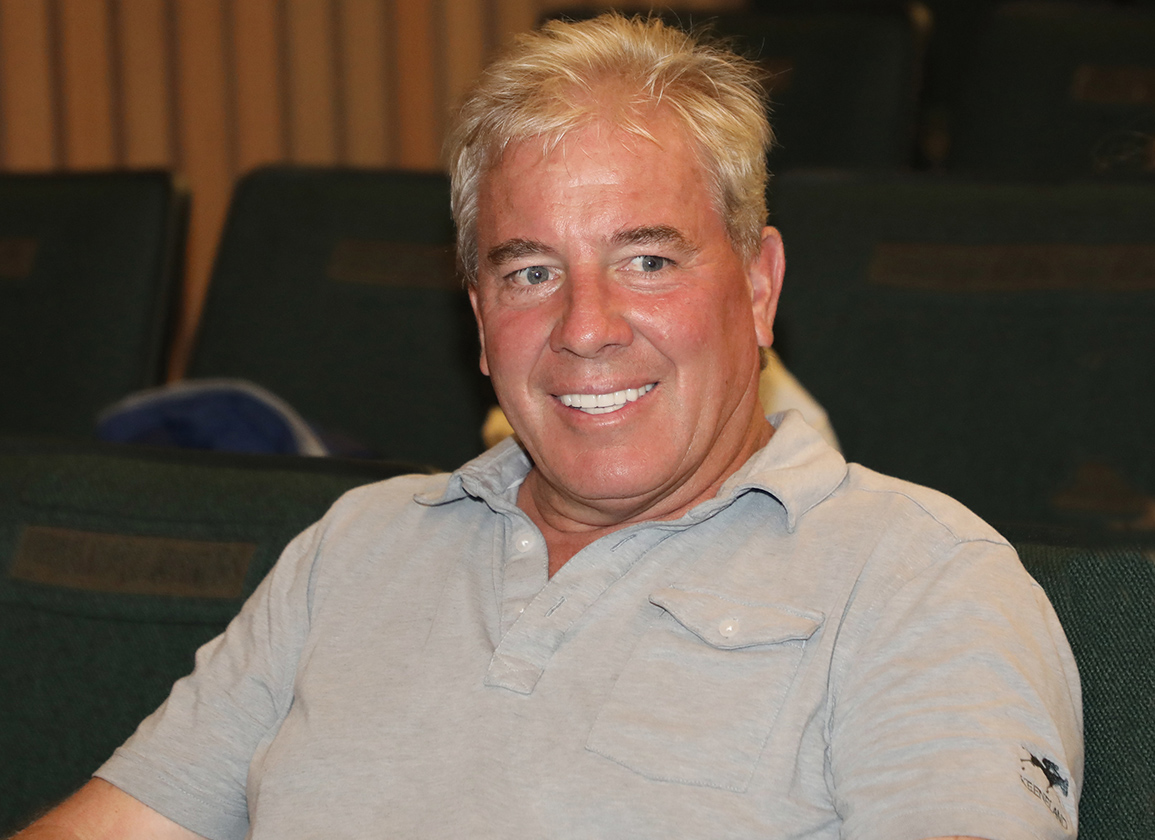By Jessica Martini
The TDN sat down with trainer Wesley Ward for the next installment in this ongoing series presented in cooperation with the Consignors and Breeders Association (CBA). Through conversations with buyers and sellers, the series looks to contribute to the discussion on radiograph findings and their impact on racetrack success.
Nothing quite goes together like Wesley Ward and winning 2-year-olds in the Spring at Keeneland. The leading trainer at six Keeneland Spring meets, Ward's early starting juveniles are usually treated as sure things when they head to the post. The group is generally a mix of homebreds from Ward's successful off-the-beaten path breeding operation, as well as horses purchased for clients at the previous fall's yearling sales.
When Ward is shopping the yearling auctions, he said he has one non-negotiable on the vet work.
“I always scope,” Ward said. “That's what we start with. The horse has to scope fine. That's number one. When I am buying horses at sales, I always try to get a no-airway abnormalities. That's something that can't be rectified.”
Buying with the intention of racing gives Ward more flexibility than shoppers looking for horses to re-sell as 2-year-olds the following year.
“You are certainly going to look at any defects, as far as if there are any chips or OCDs, we take that into consideration,” Ward said. “But when I am buying yearlings, I am able to forgive a lot of things because I am going to the races. I am not going to try to resell. There will be some issues that consignors of 2-year-olds can't buy because they have to re-sell to future clients. A lot of people aren't as forgiving as I am. I tend to forgive a lot and this way they get discounted by other trainers or owners because they are relying heavily on vets. But a lot of the best horses that I have had haven't passed vets, either as yearlings or as 2-year-olds. And for me, I have never had any issues with them.”
Over his three decades as a trainer, Ward said he has learned to structure his training regimen to take into consideration those veterinary issues.
“When horses have issues, I tend to not train them very hard,” he said. “When I breeze horses, most of the riders who breeze my horses are right around 100 pounds and never over 110. I try to not go too fast with them in the mornings. I am sort of evolving with that, whereas I used to like to breeze the horses fast and get them fit. Now I tend to go the other way and I have a really light rider when they are breezing or going fast and then in the interim, I will do a lot of jogging.”
In addition to his success with sales purchases, Ward has built a steady stream of success with homebreds by less-than-commercial stallions. During the first week of this year's Keeneland Spring meet, he won with 2-year-old homebreds Bledsoe (Iqbaal), Hibernacle (Hootenanny) and Mangione (Hootenanny). Hibernacle went on to sell for $310,000 at the Keeneland April Horses of Racing Age Sale a few weeks later.
It's fair to say these homebreds have a very different upbringing than their sales counterparts.
“I try to let them be horses from the time they are born,” Ward said. “There is very little human interaction. Everything is outside, we never bring them inside, and we pet them a lot to where they are not afraid of people, but yet they are wild. That's the way I try to raise them. When we wean them, that's when we teach them to walk and we will spend about a week keeping them in the barn, putting a halter on them and walk them. And then in the springtime the following year, when they are just turning one, that's when we bring them in and swim them for about a week, not for anything other than they really learn a lot mentally. And then we will kick them out until September when we start breaking them.”
During his breaking process, Ward utilizes his horses' natural herd instinct, always working with young horses two at a time or in a large group.
“They are all together–horses are herd animals,” Ward said. “Gradually we move them from Kentucky to Florida and we start weaning them to where they can go individually. But that will be a long way. It's a long process.”
It's a long process…and where is the vet in the process?
“I have very few vet bills, but I do a lot of X-rays,” Ward said. “My veterinarian Tami Gillon will have radiographs on all of our babies just to see moving forward what issues they have and if they do have any issues, Dr. Wayne McIlwraith has been my veterinarian surgeon for 30 years. He comes in once a month and cleans up whatever we have. I just wait on him and sometimes we will have to wait a month. What I have found is that, waiting on Dr. McIlwraith to come in, that joint calms down. Say with some of the older horses who are injured in a race or work, if they chip an ankle or a knee, the longer you wait to fix whatever issue there is, it helps to let that joint calm down and just keep that horse in the stall until he can get in there and he cleans it up.”
While the process of raising his young horses may be long, Ward thinks it shows up in the way they perform on the racetrack.
“That wildness is still in them,” he said. “Which is why I think raising them that way, they outrun their pedigrees.”
The sales yearlings, on the other hand, come into Ward's barn with a whole other upbringing and their addition to the herd can help bring the homebreds up to speed.
“The ones I get from the sale are pretty much already broke,” Ward said. “They have been handled so much and prepped so much that it doesn't take much with them. We will get them and turn them out with the ones that I raised and we will sort of use those horses who are way more advanced. They are a lot easier to break than mine and they help mine because they will follow them. Mine, you can hardly lead them. And these ones are essentially broke. Mine are followers. They will follow the other horses, but within a couple of weeks, they fall right into where you couldn't tell who is who.”
Check out previous installments of The X-Ray Files: with Tom McCrocklin, David Ingordo, Liz Crow, Ciaran Dunne, and Bill Heiligbrodt.
Not a subscriber? Click here to sign up for the daily PDF or alerts.






